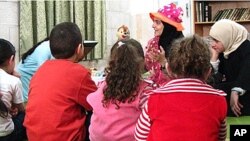During the five years Jordanian Rana Dajani and her family lived in the United States, the local public library was a big part of the family's life.
"When I was doing my PhD in the United States, on a Fulbright scholarship, I used to spend all my evenings with my mice in the lab and my children - I have four children - they spent all their time in the public library," she says. "It's full of not just books, but activities, volunteerism, read-aloud [sessions], puppet shows and so on."
No libraries
She says that's why, when the family moved back to Jordan, the public library was what they all missed the most.
"We realized there were no libraries and if they were, they were very few," she says. "Most importantly, they didn't have any activities. We looked at the statistics and it turned out that the number of pages read in the Middle East per year is half a page, compared to the U.S. where it is 11 books per year. When I say reading, I mean reading for pleasure, not reading of education because the education level in Jordan is pretty high. We're talking about reading that creates imagination, thinking outside the box, that there is more to life than my immediate environment, that there are other solutions out there."
Dajani, a biology professor at the Hashemite University in Jordan, looked closely at the problem to figure out why children in Jordan do not read.
"The reason they don't read was not for lack of books, but most important it's for lack of experience," she explains. "Nobody reads to them. In order to plant the love of reading, you have to read to your children at an early age. Nobody does that. It's not a habit in Jordan."
We Love Reading
So, with the encouragement and help of her children, Dajani took it upon herself to create a public library in their neighborhood. In 2006, she began holding story-telling sessions for 8 to 10-year olds in a nearby mosque.
"We announced through the Friday prayers that there was going to be a read-aloud on Saturday morning," she says. "So the parents dragged their children, but after that, the children were coming by themselves. They would wake up really early in the morning and say, 'We want to go to the story telling, we want to listen to the stories.'"
After each story-telling session, the children are allowed to check out a copy of the book, take it home and read it with their parents. Dajani says that's how We Love Reading was born. The project has created a cadre of young readers in the neighborhood.
"The proof of this is that, when they line up to take the books home, they know the name of the authors," she says. "They recommend books to each other."
Reading, Dajani says, has had a positive impact on many aspects of the children's lives.
"First, they are off the street. It saves some lives," she says. "On the educational level, these children will be doing better in school. Reading will provide them with a greater vocabulary. So they will hopefully be writers in the future because it is a circle - the more readers you have, the more writers you have. And parents are so happy that the children are spending more time doing useful things and learning the enjoyment of reading because nothing can substitute for that, not TV, not the Internet, just to enjoy the written word."
Furthering the dream
Dajani's dream - to see the We Love Reading project expand beyond her neighborhood - became a reality a few years later.
"In 2008, I won an award from Synergos, which is a New York-based organization that fights poverty and injustice in the world. They have started a program called 'The Arab World Social innovators,'" she says. "So I won the award and that provided me with enough funding to be able to start a training program for ladies in their local neighborhood. We would train them how to read aloud. The fund also gave me the ability to buy them books. I would buy 20 books for every lady. We've trained 380 ladies. This training for the ladies hasn't just given them the ability to read aloud, it has empowered them to be civically and socially responsible outside their home."
Eighty local libraries have been established in communities throughout Jordan, serving more than 4,000 children.
Expanded opportunity
Dajani joined other activists, academics and private citizens from around the world at the 2010 Clinton Global Initiative conference in New York. Each year the organization - which was founded in 2005 by President Bill Clinton - brings together dozens of innovators who work to solve community problems in sustainable and effective ways.
Dajani says her participation in the 2010 Clinton Global Initiative conference gave her the opportunity to further expand the program, and gain valuable insights into social activism.
"I met women from different areas of the world: from Latin America, Africa and Southeast Asia," she says. "And we've actually set up partnerships with these different women, like they're planning to copy our model in Indonesia, Peru and, hopefully, in other Middle Eastern countries. On the other hand, I've also learned about how people are facing other problems, how people are working in teams to solve problems such as women's economic independence, such as environmental awareness. So it's been an eye-opener on how everybody plays a role in trying to make this world a better place for everyone."
During the conference, We Love Reading made a commitment to establish 100 more libraries throughout Jordan over the next five years. Visitors to Rana Dajani's website can learn how to create a library in their neighborhood.





